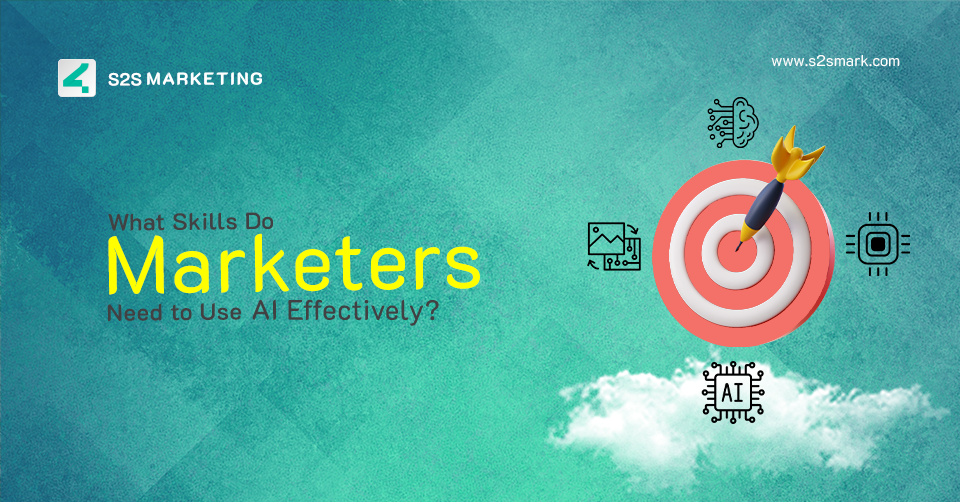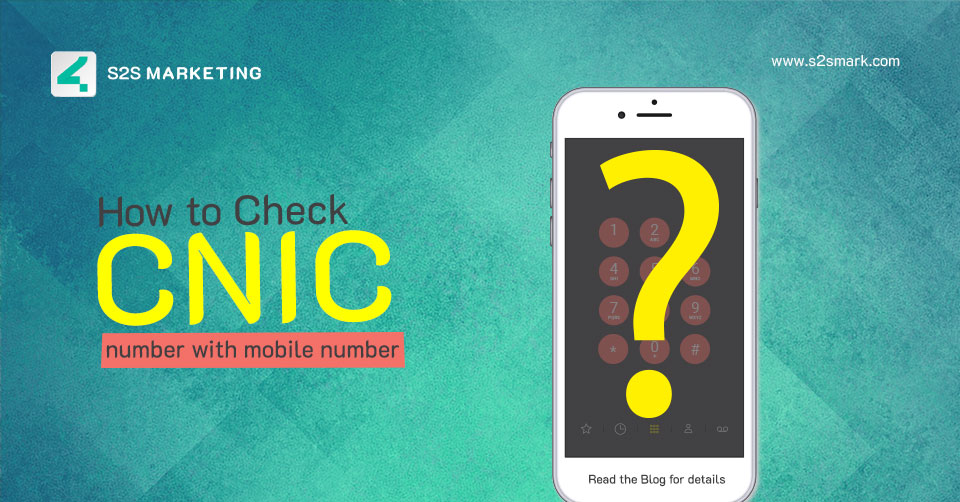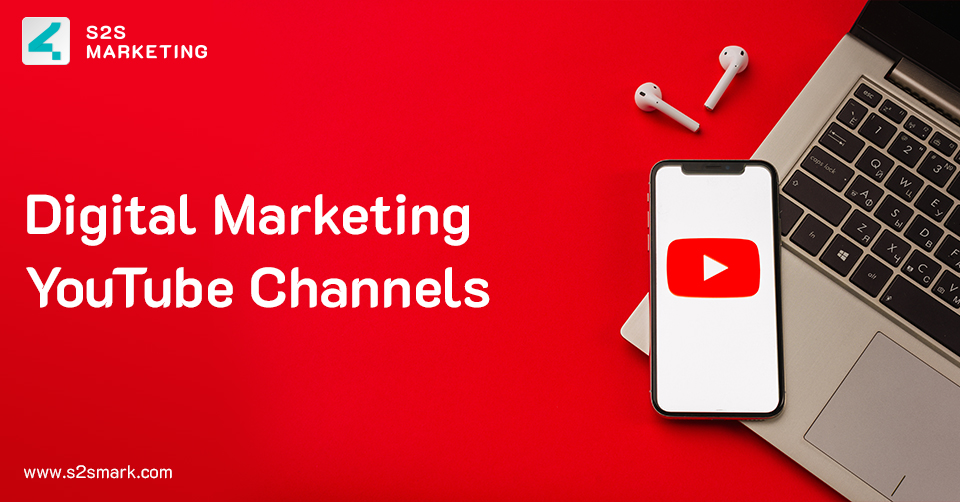In the rapidly progressing marketing landscape, mastering Artificial Intelligence (AI) is not just an option – it’s a must. Businesses are already leveraging AI for enhanced efficiency and insights. Therefore, marketers must equip themselves with the right skills to harness the full potential of AI.
AI is both exciting and concerning for marketers. It’s already benefiting digital marketing by automating tasks, personalizing campaigns, and providing customer insights. However, AI has disadvantages, such as security risks, ethical considerations, and job displacement.
In today’s blog, S2S marketing will share skills that Marketers must learn to work with AI to thrive in this new age or fill the gaps it can’t.
8 Essential Skills for Marketers in the Age of AI
Here are eight essential skills required to help marketers thrive in the age of AI.
1. Content creation and generation
AI can help with content creation. It can assist with content ideation, keyword research, and even kickstart a blog introduction you need help with. It can also generate content for time-consuming tasks, freeing you for more creative and enjoyable endeavors.
In 2024, you can expect generative AI technologies to assist you with a variety of tasks, including:
- Blog writing
- Content ideation
- Email marketing
- Image creation
- Sales Writing
- Social media marketing
- Video production
Including AI in your content creation strategy and process is essential for the social media content optimization. The more you understand AI, the more benefits you can derive from it. Having a good grasp of AI will also help you stay competitive in job opportunities and promotions.
2. Data analysis
Many businesses aim to use data to gain insights and make data-driven decisions. According to a report by Pecan AI, more than 80% of marketing executives require assistance to make such decisions, and 84% admit that predicting customer behavior feels like guesswork.
AI technology is a fantastic tool that enables you to analyze all available data sources, not just from GA4, such as reviews, forums, and social media posts, to get an idea of what your customers say. Text analytics can provide insight into customer sentiment, discussions, and conversation trends.
To implement AI successfully, you must continually improve your data analysis skills to extract more insights from AI technology. Enhancing your expertise in the following areas is crucial to set up and operationally deploy the necessary AI systems.
- Data cleaning and management
- Data collection
- Data protection and privacy
- Data visualization
- Data-driven decision-making
3. Data Privacy & the Ethics of AI
According to Salesforce research, due to the rise of AI and automation, data security skills and ethical skills are becoming increasingly important in the workplace. In fact, 60% of leaders believe in the former, and 58% believe in the latter.
AI platforms are already widely used to gather and sort information through chatbots or automation. This gives marketers access to a lot of customer data, which is great but has ethical implications. For instance, if customers are tracked using AI without consent or if bias occurs due to poor or misrepresented data.
So, for marketing teams, transparency is key when using AI and collecting and processing personal data. Companies should ensure that their systems are secure, private, and non-discriminatory to prevent any issues with data privacy.
4. Experience of AI tools and platforms
As a marketer, it is important to have a working knowledge of the various AI tools and platforms available. These tools can significantly benefit your day-to-day tasks by automating time-consuming and tedious responsibilities. They provide an opportunity to streamline your work and increase your efficiency.
Here are just some of the ways AI can help you out:
- Audience research
- Customer journey mapping
- Idea generation and content research
- Keyword research
- -Trend analysis and forecasting
- -Competitor monitoring
- -Sales automation
- Social media management and advertising
-Writing and content generation
And the best part? There are some fantastic tools out there that can assist you with these tasks! For example, Clearscope can help with keyword research and integration, TrendKite can alert you to upcoming trends, Outreach can transform sales data into actionable insights, CaliberMind can augment B2B sales, and Market Brew can reveal data for your SEO strategy.
So why not take advantage of these tools? Give them a try and see how they can positively impact your work!
5. Knowledge of ChatGPT
AI has been around for quite some time now, but what really changed the game is ChatGPT!
ChatGPT is an AI system that uses a generative language model to help you have conversations, gain insights, and automate tasks. Even though it became mainstream only in November 2022, countless people already use it for various purposes, from ideation to content creation and analysis.
What’s exciting is that ChatGPT is the foundation for many future AI technologies. For instance, DALL-E 3, an image generator, is built natively on ChatGPT and has evolved to make things easier for marketers by eliminating the need for prompt engineering.
A few important things about ChatGPT to remember
- It understands your input and responds accordingly
- It can handle multiple users simultaneously
- It can communicate in multiple languages.
- You can train it as per your field requirements.
- ChatGPT is an excellent place to start using generative AI technology.
However, there are some limitations of ChatGPT, so you should optimize your content as per your requirements.
6. Marketing automation
You can quickly identify the best channels, platforms, and times to reach your target audience using automation tools. Plus, you can automate a wide range of marketing activities, which includes email marketing, lead generation, social media management, content creation, and performance tracking.
For example, you can create triggered workflows and drip campaigns, segment audiences into lists, and personalize your messages and design effcient email marketing strategies. You can also find and nurture customers, segment your traffic, and enable greater personalization for lead generation. You can use chatbots to respond to messages, schedule social posts across channels, and track social conversations for social media management.
You can also get ideas for content and generate compelling marketing material based on input parameters such as style, tone, and subject matter for a range of formats. Lastly, you can track the success of your campaigns by plugging in the most relevant and vital metrics for performance tracking.
So, if you want to make your marketing efforts more efficient and effective, AI and automation can lend a helping hand!
7. SEO
Search engine optimization (SEO) is crucial to any marketing team’s activities. By understanding what people search for in search engines, brands can create content that meets their needs and ranks higher in search results. However, the SEO landscape is evolving, and Google relies on algorithms that evaluate pages based on their Experience, Expertise, Authoritativeness, and Trustworthiness (EEAT). AI continuously improves these processes and algorithms to make search results more accurate, comprehensive, and personalized.
As of early 2024, Google’s Search Generative Experience (SGE) is still experimental, but it’s already disrupting the search results and may impact clickthrough rates. When you search for something using SGE, you get a ‘snapshot’ that includes several elements, such as a generative answer, a website carousel, follow-up questions, and suggestions.
Marketers can use AI tools like MarketMuse, Ahrefs, SurferSEO, and SEMrush to improve their SEO. These Keyword Research Tools can help them identify high-impact keywords and predict keyword trends.
8. Soft Skills
Soft skills such as strategic thinking, creativity, agility, collaboration, and a willingness to learn are now essential for any marketer who wants to succeed in this rapidly changing landscape. Marketers who leverage AI must not only master technical skills but also cultivate these vital soft skills to stay ahead of the curve. By understanding AI algorithms and their potential risks, marketers can fuel their creativity while protecting themselves from unforeseen challenges.
Let’s Wrap it Up:
The rise of Artificial Intelligence (AI) technology with continuous updates is set to bring a major shift in the digital marketing landscape. Marketers need to keep learning and upgrading their knowledge to stay ahead of the competition. With a good understanding of AI technology, they can use it effectively in their marketing campaigns and gain an edge in the ever-changing digital landscape.





